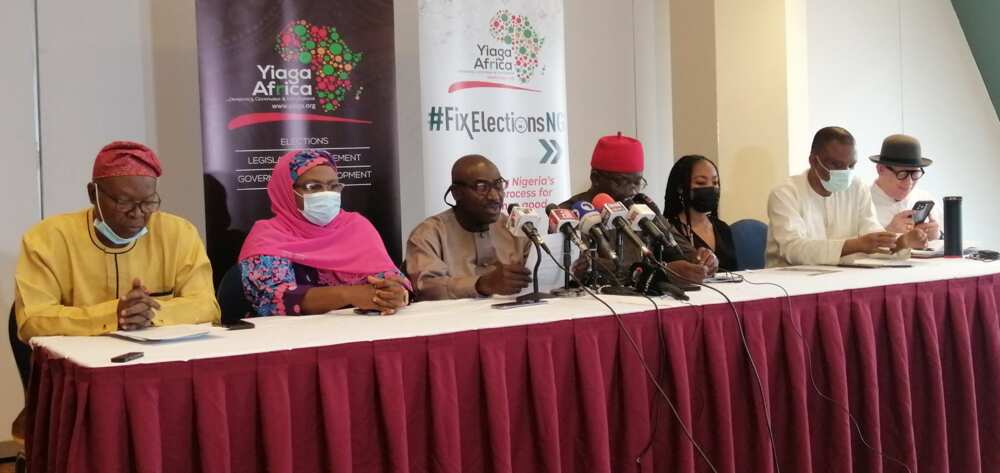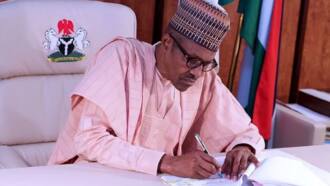Electoral Bill: 7 Key Resolutions From Yiaga Africa’s Citizens’ Townhall
- Some prominent Civil Society Organisations on Sunday, January 16 hosted a citizens’ townhall forum on the Electoral Bill 2021
- The need for the National Assembly to prioritise the review of the bill with dispatch on its resumption from recess was top on the agenda of the townhall
- Participants emphasized the imperative of a speedy enactment of the bill to strengthen Nigeria's electoral legal framework
FCT, Abuja - On Sunday, January 16, Yiaga Africa led other prominent Civil Society Organisations to host a Citizens’ Townhall Forum on the Electoral Bill 2021.
The townhall served as an opportunity to bring the Nigerian public up to speed on key provisions in the bill and how they will enhance the integrity of future elections.

Source: Facebook
The participants at the town hall meeting were drawn from the National Assembly, political parties, civil society, media, professional associations, labour unions, and citizens.
Key resolutions from the citizens’ townhall are as follows;
PAY ATTENTION: Install our latest app for Android, read best news on Nigeria’s #1 news app
1. A new legal framework is central to the integrity of 2023 General elections and future elections and the advancement of Nigeria’s democracy.
2. Against the background of the changing electoral environment and innovations introduced by the Independent National Electoral Commission (INEC) to enhance electoral integrity it is inconceivable to conduct the 2023 general election and future elections with the current legal framework, the 2010 Electoral Act as amended.
3. The Electoral Bill 2021 reflect the wishes of Nigerians and key electoral stakeholders for a legal framework that promotes the use of technology and other innovations to stem electoral manipulation, strengthens INEC’s financial independence, and empowers the commission to reject falsified election results.
4. Further delay to the conclusion the Electoral Act amendment process is inimical to the preparations for Ekiti and Osun off-cycle governorship election, the 2023 general election, and future elections.

Read also
FG in trouble as coalition set to mobilise Nigerians to resist gas, fuel hikes, electricity tariffs
5. The opportunity to test the operability of the new legislation and functionality of the new innovations will be lost if the amendment process is not concluded expeditiously.
6. Today, with only 398 days to the 2023 general election, it is crucial for the National Assembly and president to conclude the electoral amendment process by 31 January 2022.
7. The National Assembly should remove the contentious clause of direct primaries, resolve all the identified drafting errors and cross-referencing gaps and re-transmit the bill to the president for assent within a week of resumption.
Other CSOs who signed the resolution are the International Press Centre, Centre for Citizens with Disability, The Albino Foundation, CLEEN Foundation, Institute for Media and Society, Nigerian Women Trust Fund, and the Premium Times Centre for Investigative Journalism.
Others are the Partners for Electoral Reform, Civil Society Legislative Advocacy Centre Women Advocates Research and Documentation Centre and the Nigerian Network of Non-Governmental Organizations.
Electoral Bill: Override or remove contentious clause - CSOs tell National Assembly
The CSOs had earlier expressed their disappointment at the failure of President Muhammadu Buhari to sign the Electoral Amendment Bill 2021.
In a statement sent to Legit.ng on Tuesday, December 21, 2021, they lamented that the withholding of assent by the president to a bill undermines public confidence and trust in Nigeria's electoral system.
The groups, however, advised the National Assembly to either override the president to sign the bill or remove the contentious clause and return it back to the president.
Professor Jega asks Buhari to give nod to electoral bill
Recall that a former chairman of INEC, Professor Attahiru Jega, at the event, called on President Buhari to give assent to the Electoral Amendment Bill on time.
Jega stated that INEC needs the law in place to begin serious preparations for the 2023 elections. He admitted that some issues in the bill need clarification, but added that other aspects of the document deserve the president's nod.
Going back memory lane, the former INEC boss stated that since 2010, Nigeria has not had any notable improvement in its electoral laws.
Source: Legit.ng


